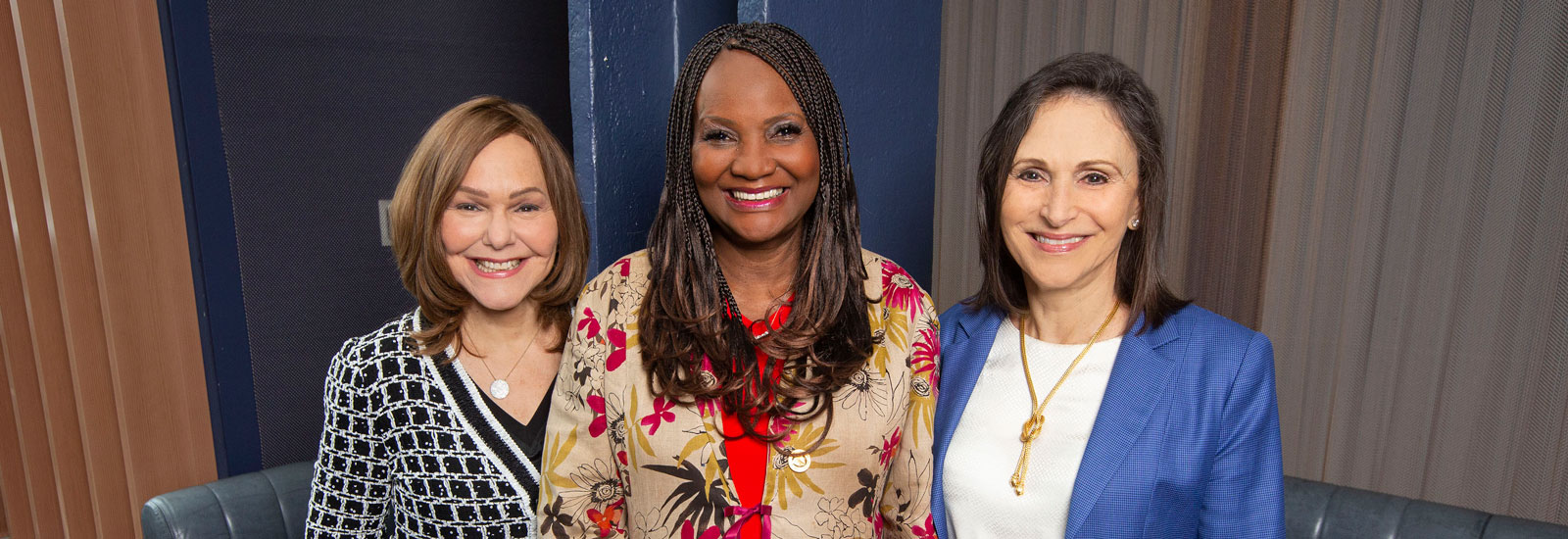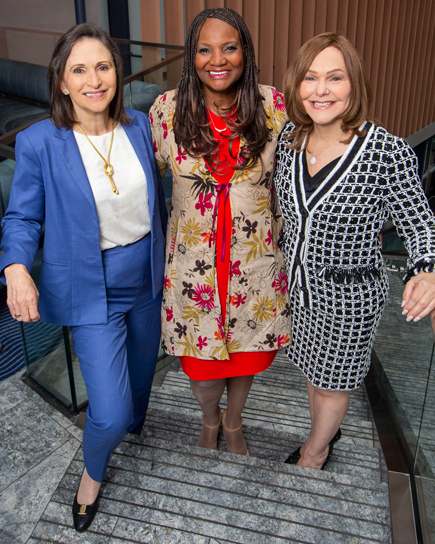Over the years, five of the school's 16 deans have been women. Female graduates have worked at all levels of government, served as federal and state judges, and risen through the ranks of domestic and international businesses. They've served as advocates for refugees and asylum-seekers and helped protect the constantly imperiled Everglades.
There are too many to name, but a few illustrate Miami Law's exceptional female leaders. In April, Yvette Ostolaza, B.A. '85, J.D. '92, became chair of the management committee at Sidley Austin, making her one of only a handful of women to hold such a role at a global law firm. Personal injury lawyer Julie Braman Kane, J.D. ’93, is a recent past president of the American Association for Justice, the world’s leading trial bar.
The Honorable Bertila Soto, J.D. ’89, became the first Hispanic Chief Judge in the county and was the first female Cuban American Chief Judge on the 11th Circuit in Miami-Dade. The Honorable Laurel M. Isicoff, J.D. ’82, is the first woman chief judge of the U.S. Bankruptcy Court for the Southern District of Florida.
Patricia Ireland, J.D. '75, served as the National Organization of Women president for 10 years. In July, DeAnna Allen, J.D. '96, became the president of the National Association of Women Lawyers, following in the footsteps of Dorian Denberg, J.D. ’92, who served as president of NAWL in 2010 – 2011.
“As a new member of the Miami Law community, I am extremely proud of our history of women leading the way,” said Miami Law Dean David Yellen, who began his term in July. “From our three ABA Presidents to our five deans, Miami Law has been graced by so many women who are great lawyers and great leaders.”
Helping the Next Generation
Miami Law’s female graduates have tried to make climbing the legal ladder a little easier for the next generation.
Lamm, an international arbitration expert, created the Carolyn Lamm/White & Case Scholarship to help students trying to get a postgraduate degree in the White & Case International Arbitration LL.M. , and six of the past seven recipients have been women.
Bass has donated so much money to scholarships at Miami Law that the school renamed the brick courtyard at the center of the law campus “The Bass Bricks.”
Silvers has donated several scholarship funds at Miami Law and mentors young women in high school. Once a month, Silvers visits Spanish River Community High School in Boca Raton and counsels female students on their schooling, dreams of college, and life goals.
“It’s more than just writing a check to some wonderful charity,” Silvers said. “When you can be in someone’s life, coach them, and help turn them around, it’s so fulfilling.”
As each has risen, they’ve also used their increasing power to demand more women in the legal profession, from associate level to the C-suite.
As a board member of the International Council for Commercial Arbitration, Lamm brought together representatives of the major international arbitration institutions globally on a task force that ICCA co-sponsored to produce a 227-page report on gender diversity within that field. The report found that after years of work to diversify its ranks, women still comprised only 21% of the international arbitrators appointed in 2019.
But Lamm said the true power of that report was creating a roadmap for female attorneys trying to break into that field. And as a partner at White & Case, she has ensured that her teams of attorneys include many women.
“I try to work with the best,” she said. “I really think women have an obligation to help other women, to help other women have an easier time moving forward.”
When Enix-Ross was named the American representative to the International Court of Arbitration—the first for a Black woman—she remembers the first time she was asked to suggest an arbitrator for a case. A colleague handed her the pre-drawn list of recommendations.
“The list might’ve had 30 names on it, but there were no women,” she said.
She changed that and has tried to hire more women at each career step. As president of the ABA, she isn’t shy about saying that diversity will be a significant factor when making the hundreds of committee appointments within the association.
She’s already named Roula Allouch, the daughter of Syrian immigrants, to head the ABA’s Center for Human Rights.
“She wears the hijab, she’s young, she’s dynamic,” Enix-Ross said. “She is a rising star, and I cannot tell you how good it feels to play a small part in supporting her.”
Bass, the Miami Law grad who headed the ABA from 2017 – 2018, has taken her commitment to diversify the legal profession to a career-defining level. As president of the association, she created the “Presidential Initiative on Achieving Long-Term Careers for Women in Law,” which has led to a vast body of research understanding the problem and charting paths to fix it.
Then, after 39 years at Greenberg Traurig, where she rose from being Mel Greenberg’s mentee to co-president of one of the biggest law firms in the world, she left to start the Bass Institute for Diversity and Inclusion.
As the president and founder of the institute, Bass shows law firms how to change their hiring and retention practices to remove the implicit (and explicit) bias that continues to harm females and other minorities in the field. She works directly with young female attorneys to help them chart their courses. And she works to shift the profession away from “check the box” moves on diversity to actual, lasting changes.
We now know what it takes for women to be successful. We now know what law firms need to do to ensure they’re being supportive of women. But it starts with a commitment from senior leadership. Unless it’s there, it’s all words on a page.
On the Road Towards Equity
Bass says female attorneys are in a much better position today, though still cognizant of how far they remain from true equity.
According to the ABA’s 2021 report on gender disparity—the fourth in a series of reports ordered by Bass—women make up 36% of lawyers nationwide and 47% of associates, but only 24% of partners. Women of color face an even harsher climate: they represent only 3% of all equity partners.
Even when women reach partner status, the ABA found that male equity partners earned 27% more than their female counterparts.
Along the way, women still face bias that drives many of them out of the profession entirely. They are less likely to be in the lead chair during jury trials or named the lead of corporate deals.
Bass estimates that 80% of annual reviews of women still mention their personality in some way, compared to less than 20% of male reviews. And despite all the advancements of the #MeToo movement, the Women’s March, and other women’s rights drives, about 50% of female attorneys still say they’ve received unwanted sexual advances at work, according to the ABA.
According to Bass’ research, by age 50, nearly 75% of female attorneys have left the profession. Bass said those numbers show a significant problem remaining in the quest for gender equity in the legal world. She said “superstars” like Lamm would always find a way to succeed.
“You’re not going to keep someone like that down,” Bass said. “But when you look at the average, hard-working lawyer who just wants to have a great career, then you really find very few women and a whole lot of men. We’ll know we’ve really arrived when the average, hard-working woman lawyer can do as well as the average, hard-working man.”
Lamm said she’s thrilled to see more female faces on the three-member panels that decide most international cases. But even then, she sees the ongoing problem.
“To see one appointed is a big thing,” she said. “To see multitudes, that’s not always the case. There are a lot of things in terms of life and in terms of business that still need to progress.”
Bass said some law firms have decided on their own to diversify their leadership, and others are forced. Many firms had to address the raging pay disparity between men and women. Larger clients have demanded that their law firms increase the number of women and minorities in their upper ranks, even requiring diversity numbers for specific teams working their accounts.
But even with that pressure, Bass said the number of women at the top of law firms has leveled off or even begun to shrink in recent years.
Enix-Ross looks at the landscape for women in her field, and she remains conflicted.
She thinks back to her time at Miami Law when she was one of just two Black women in her class, paying for her tuition and books with small donations from her church back in her hometown of Harlem. But then she considers her success. She ponders the success of her other Black classmate, Teretha Lundy Thomas, who served as an administrative judge on the 11th Judicial Circuit of Florida for over 25 years. She praises the historic ascension of Justice Brown Jackson to the Supreme Court.
“We should be careful to stop and take a moment to reflect on how far we’ve come, gain some energy, and then press forward,” she said. And then she smiles.





